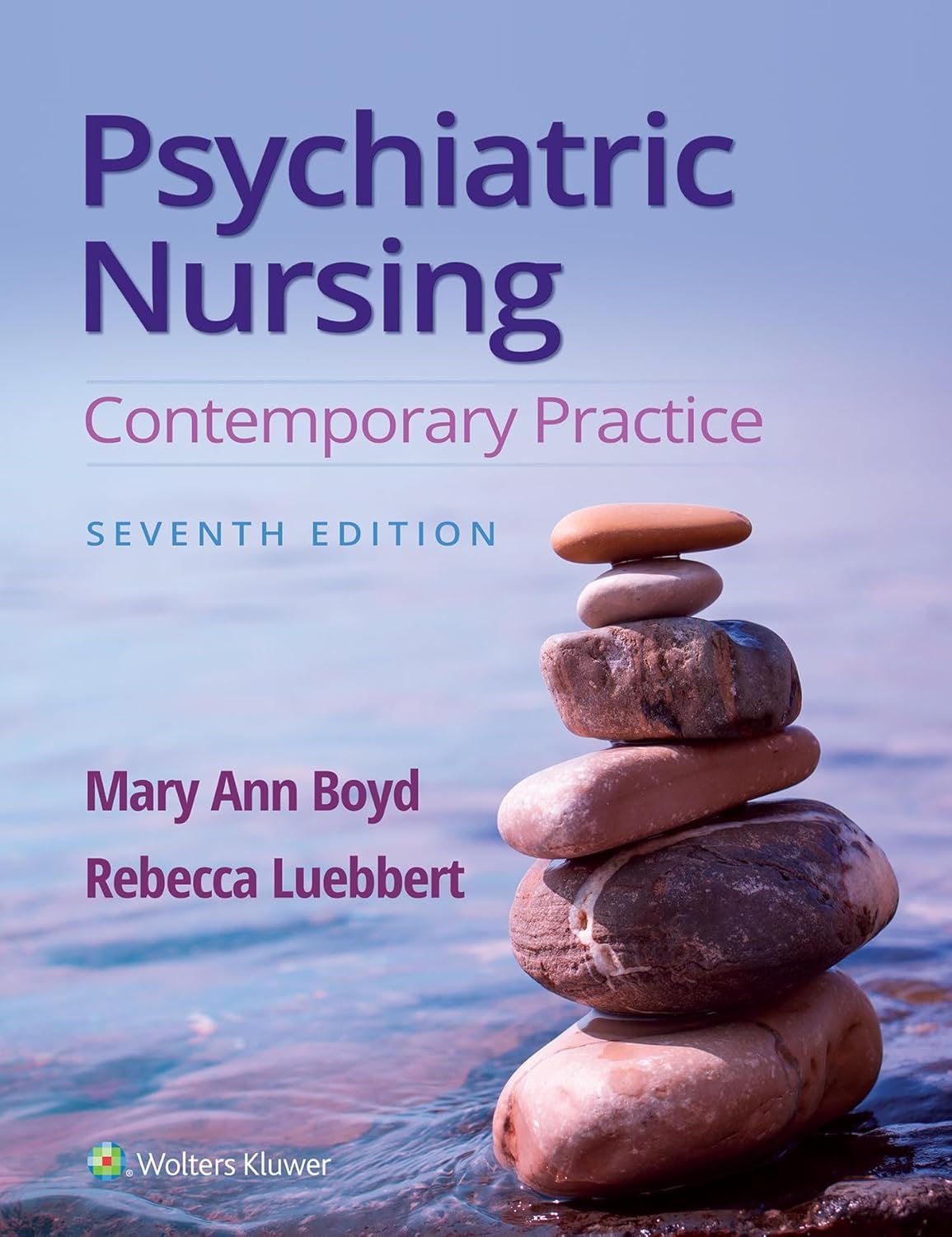Test Bank for Psychiatric Nursing: Contemporary Practice 7th Edition
$26.00 Original price was: $26.00.$23.00Current price is: $23.00.
A complete psychiatric nursing test bank for Psychiatric Nursing: Contemporary Practice (7th Edition) by Boyd & Luebbert. NCLEX-style questions with answers/rationales across all chapters—perfect for students and educators focused on evidence-based mental health care.

Description
About Psychiatric Nursing Contemporary Practice Test Bank 7th Edition
This comprehensive psychiatric nursing test bank aligns with the 7th Edition of Psychiatric Nursing: Contemporary Practice by Mary Ann Boyd and Rebecca Ann Luebbert. It’s designed to strengthen clinical reasoning, therapeutic communication, and evidence-based practice across the full spectrum of psychiatric–mental health nursing. Ideal for BSN, MSN, and PMHNP pathways, as well as faculty creating reliable assessments.
What’s Inside
- Extensive NCLEX-style questions mapped to every chapter of the 7th Edition.
- Answers with concise rationales to reinforce key concepts and clinical application.
- Coverage of recovery-oriented care, stigma reduction, psychopharmacology, crisis intervention, and population-focused mental health.
- Downloadable digital format for quick search, printing, and LMS upload.
Table of Contents
Chapter 1, Psychiatric–Mental Health Nursing and Evidence-Based Practice Chapter 2, Mental Health and Mental Disorders: Fighting Stigma and Promoting Recovery Chapter 3, Cultural and Spiritual Issues Related to Mental Health Care Chapter 4, Patient Rights and Legal Issues Chapter 5, Mental Health Care in the Community Chapter 6, Ethics, Standards, and Nursing Frameworks Chapter 7, Psychosocial Theoretic Basis of Psychiatric Nursing Chapter 8, Biologic Foundations of Psychiatric Nursing Chapter 9, Recovery Framework for Mental Health Nursing Chapter 10, Communication and the Therapeutic Relationship Chapter 11, The Psychiatric–Mental Health Nursing Process Chapter 12, Psychopharmacology, Dietary Supplements, and Biologic Interventions Chapter 13, Cognitive Interventions in Psychiatric Nursing Chapter 14, Group Interventions Chapter 15, Family Assessment and Interventions Chapter 16, Mental Health Promotion for Children and Adolescents Chapter 17, Mental Health Promotion for Young and Middle-Aged Adults Chapter 18, Mental Health Promotion for Older Adults. Chapter 19, Stress and Mental Health... Chapter 20, Management of Anger, Aggression, and Violence Chapter 21, Crisis, Loss, Grief, Bereavement, and Disaster Management Chapter 22, Suicide Prevention: Screening, Assessment, and Intervention Chapter 23, Mental Health Care for Survivors of Violence Chapter 24, Schizophrenia and Related Disorders: Nursing Care of Persons with Thought Disorders Chapter 25, Depression: Nursing Care of Persons with Depressive Moods and Suicidal Behavior Chapter 26, Bipolar Disorders: Nursing Care of Person with Mood Lability Chapter 27, Anxiety Disorders: Nursing Care of Patients with Anxiety, Phobia, and Panic Chapter 28, Obsessive-Compulsive and Related Disorders: Nursing Care of Persons with Obsessions and Compulsions Chapter 29, Trauma and Stressor-Related Disorders: Nursing Care of Persons with Posttraumatic Stress and Other Trauma-Related Disorders Chapter 30, Personality and Impulse-Control Disorders: Nursing Care of Persons with Personality and Impulse-Control Disorders Chapter 31, Addiction and Substance Use-Related Disorders: Nursing Care of Persons with Alcohol and Drug Use Disorders Chapter 32, Eating Disorders: Nursing Care of Persons with Eating and Weight-Related Disorders Chapter 33, Somatic Symptom and Dissociative Disorders: Nursing Care of Persons with Somatization Chapter 34, Sleep-Wake Disorders: Nursing Care of Persons with Insomnia and Sleep Problems Chapter 35, Sexual Disorders: Management of Persons with Sexual Dysfunctions and Paraphilias Chapter 36, Mental Health Assessment of Children and Adolescents Chapter 37, Mental Health Disorders of Childhood and Adolescence Chapter 38, Mental Health Assessment of Older Adults Chapter 39, Neurocognitive Disorders Chapter 40, Care of Veterans with Mental Health Needs Chapter 41, Caring for Persons Who Are Experiencing Homelessness and Mental Illness Chapter 42, Caring for Persons with Co-occurring Mental Disorders Chapter 43, Care of Persons Who Are Medically Compromised
Sample Questions
Chapter 2, Mental Health and Mental Disorders: Fighting Stigma and Promoting Recovery MULTIPLE CHOICE 1. As part of a class activity, nursing students are engaged in a small-group discussion about the epidemiology of mental illness. Which statement best explains the importance of epidemiology in understanding the impact of mental disorders? a. Epidemiology helps promote understanding of the patterns of occurrence associated with mental disorders. b. Epidemiology helps explain research findings about the neurophysiology that causes mental disorders. c. Epidemiology provides a thorough theoretical explanation of why specific mental disorders occur. d. Epidemiology predicts when a specific psychiatric client will recover from a specific mental disorder. ANS: A Epidemiology is the study of patterns of disease distribution and determinants of health within populations. It contributes to the overall understanding of the mental health status of population groups, or aggregates, and it examines the associations among possible factors. Epidemiology does not explain research findings about neurophysiology, provide theoretical explanations for why specific disorders occur, or predict recovery. PTS: 1 REF: p. 18, Summary of Key points OBJ: 4 NAT: Client Needs: Safe, EffeWcWtiWve.CTaBreSEMn.vWiroSnment: Management of Care KEY: Integrated Process: Nursing Process BLM: Cognitive Level: Understand NOT: Multiple Choice 2. A nurse is working in a community mental health center that provides care toa large population of people of Asian descent. When developing programs for this community, which would be most important topic for the nurse to address? a. public stigma b. self-stigma c. label avoidance d. negative life events ANS: C Although public stigma and self-stigma may be areas needing to be addressed, in this cultural group, label avoidance would be most important. Label avoidance or avoiding treatment/care so as not to be labeled mentally ill is a type of stigma that influences why so few people with mental health problems actually receive assistance. Asian cultures commonly have negative views of mental illness that influence the willingness of members to seek treatment; they possibly ignore the symptoms or refuse to seek treatment because of this stigma. Negative life events affect anyone, not just those of the Asian culture. PTS: 1 REF: p. 16, Label Avoidance OBJ: 5 NAT: Client Needs: Psychosocial Integrity KEY: Integrated Process: Nursing Process10 | P a g e BLM: Cognitive Level: Understand NOT: Multiple Choice 3. A nursing student is assigned to care for a client diagnosed with schizophrenia. When talking about this client in a clinical post-conference, the student would use which terminology when referring to the client? a. Committed client b. Schizophrenic c. Schizophrenic client d. Person with schizophrenia ANS: D Just as a person with diabetes should not be referred to as a “diabetic” but rather as a “person with diabetes,” a person with a mental disorder should never be referred to as a “schizophrenic” or “bipolar,” but rather as a “person with schizophrenia” or a “person with bipolar disorder.” Doing so helps to counteract the negative effects of stigma. PTS: 1 REF: p. 15, Stigma OBJ: 5 NAT: Client Needs: Psychosocial Integrity KEY: Integrated Process: Nursing Process BLM: Cognitive Level: Apply NOT: Multiple Choice
Key Features
- Mapped to all chapters of the 7th Edition for complete coverage.
- NCLEX-style multiple-choice items with correct answers and rationales.
- Focus on recovery models, stigma reduction, trauma-informed care, and cultural safety.
- Instructor-friendly for quiz/exam construction; student-friendly for self-assessment.
- Instant digital access for flexible study across devices.
Who Should Use This Test Bank?
- Nursing students preparing for psychiatric–mental health rotations and the NCLEX.
- PMHNP and advanced practice students reinforcing psychopharmacology and interventions.
- Educators building valid, reliable assessments aligned to evidence-based practice.
Frequently Asked Questions (FAQ)
What does this psychiatric nursing test bank include?
It provides NCLEX-style questions mapped to all chapters of the 7th Edition, with correct answers and rationales to strengthen clinical judgment, therapeutic communication, and evidence-based practice.
Is this aligned with Boyd & Luebbert’s Psychiatric Nursing: Contemporary Practice (7e)?
Yes. The content follows the 7th Edition chapter structure to support course objectives and exam blueprints.
How do I receive the files after purchase?
You’ll get instant digital access (PDF/Doc) via your order confirmation and account dashboard, so you can start studying right away.
Can instructors use this for quizzes and exams?
Absolutely. Educators can select items by chapter or topic (e.g., psychopharmacology, suicide prevention, group interventions) to build reliable assessments.
Will this help with NCLEX prep?
Yes. Questions mirror NCLEX-style stems and emphasize application, prioritization, and safety competencies common to licensure exams.
Related products
-
Sale!

Test Bank for Lehninger Principles of Biochemistry, 8th Edition
0 - 0 reviews$26.00Original price was: $26.00.$23.00Current price is: $23.00. Add to cart -
Sale!

Test Bank for Foundations of Maternal-Newborn and Women’s Health Nursing, 8th Edition
0 - 0 reviews$26.00Original price was: $26.00.$23.00Current price is: $23.00. Add to cart -
Sale!

Test Bank for Davis Advantage for Basic Nursing: Thinking, Doing, and Caring, 3rd Edition by Leslie S. Treas, Karen L. Barnett & Mable H. Smith
0 - 0 reviews$26.00Original price was: $26.00.$23.00Current price is: $23.00. Add to cart -
Sale!

Test Bank for Lewis’s Medical-Surgical Nursing: Assessment and Management of Clinical Problems, 12th Edition
0 - 0 reviews$23.00Original price was: $23.00.$18.00Current price is: $18.00. Add to cart




